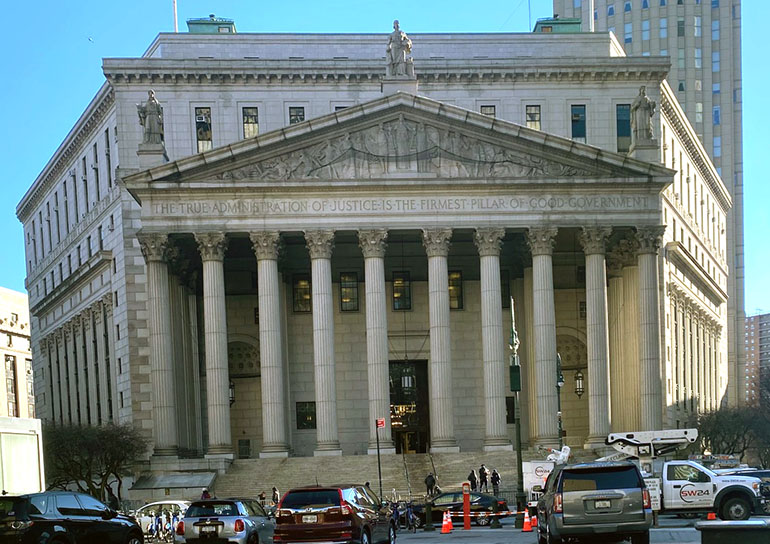
Barring something unforeseen, the trial that pits the State of New York against the National Rifle Association will go to the jury sometime today. After six weeks of allegations and responses, the jury will be given their final charge by Judge Joel Cohen and sent into deliberate the fate of the organization and the three co-defendants Wayne LaPierre, Woody Phillips and John Frazier.
In his final testimony — this time for the defense — former EVP Wayne LaPierre walked jurors through a personal timeline, from his childhood in Schenectady, New York, through college, and on through his eventual ascension to the EVP’s slot at the NRA. A slot, LaPierre told jurors, he never really wanted, saying he was more comfortable in a lobbying role.
“It wasn’t what I loved doing, to tell you the truth,” LaPierre said. The job he didn’t want, he explained, was the reason he found himself facing security risks.
At the same time, LaPierre admitted that it was largely his decision to modify his job from administration to public relations and activism, essentially making himself the face of the association.
“If we were going to be successful in growing the organization,” LaPierre said, “I needed to be out there in front of America…giving speeches all over the country…speaking to donors..I always felt the way the NRA would lose would be if it fell to the fringe.”
So he did that. And, he explained, his associations with celebrities and television appearances essentially erased his anonymity, turning him into a public figure…and bringing on security concerns that necessitated increased spending on his protection. Risks, he claims, so credible that the FBI advised him to book hotel rooms under other names.
LaPierre’s ability to convince the jury of that assertion is essential to his defense.
Throughout the trial, his attorney has tried to convince the jury that LaPierre’s private travel, security details, and other spending were essential to his safety. That, despite LaPierre having already admitted to having abused the privilege by flying friends and family members around on the NRA’s dime, telling jurors that billing the NRA for the trips was “not the right thing to do.”
From the very outset, the New York AG’s attorneys have hammered their allegation that the 74-year-old LaPierre has treated the NRA’s bank accounts as his “personal piggy bank.” The more than $11 million spent on luxury travel and accommodations are paramount in driving that case home with jurors.
Depending on final arguments and the length of the judge’s charge to the jury, it’s not inconceivable that the jurors, weary after a long civil trial, would return a verdict quickly.
It’s also not inconceivable that the complicated charges and counters may have confused them to the point that a verdict is difficult, if not impossible to reach. That could open the door for further delays as they seek clarification of thorny legal questions.
Should the verdict go against the defendants, the appeal process, NRA finances permitting, will begin almost immediately. In fact, some members of the NRA board were briefed on possible appeals before the defense began presenting its case.
So what happens in the short term if the NRA loses?
Possibilities: Judge Cohen could immediately install an outside supervisor to manage the organization until the internal issues are addressed to the satisfaction of the court.
It’s also possible that Cohen, on advice from the Attorney General’s office takes additional action, including dismissing the entire current board and ordering the NRA membership to hold a new election.
Those possibilities may be one reason why the NRA’s board has assembled an EVP search committee composed of what critics call members of the association’s old guard: Congressman Bob Barr, David Coy, Carol Frampton, Curtis Jenkins, Jay Printz, Barbara Rumpel and Blaine Wade. Conspicuously absent on the nominating committee is NRA President Charles Cotton which has lead to further speculation that he may be the (predetermined) choice of the committee.
As far as the individual defendants (LaPierre, Phillips, and Frazier) are concerned, guilty verdicts would open the issue of recovery of misappropriated funds due to failure in their fiduciary responsibilities.
The fourth defendant, Josh Powell, cut a deal with the AG just prior to the trial’s opening. In exchange for an admission of guilt and his testimony, Powell was granted a $100,000 settlement agreement.
There’s no way of knowing what kind of “clawbacks” would be sought by the AG’s office against the three remaining defendants. Or if the court would consider clawbacks from the NRA’s attorneys based on a forensic examination of their fees going back years.
It’s also possible that the verdicts are not unanimous. In other words, there’s nothing absolutely certain at this point.
Regardless of the outcome, the question of a successor to Wayne LaPierre and the duties that would be entrusted to that new executive are topmost in the minds of many. We’ve heard several names tossed around this week.
Two of the most frequently mentioned are a couple of former NRA figures: longtime NRA-ILA head Chris Cox and former Executive Director of General Operations Joe DeBergalis. Both were purged by LaPierre.
A third name — much to the fury of many former board members and reformers — is current President Charles Cotton. His many detractors say his elevation would continue exactly the same kind of organization that was created by LaPierre and enabled by Cotton in his position as chairman of an obviously ineffective audit committee.
Other names mentioned — although considerably more quietly — include: Alan Gottlieb, founder of the Second Amendment Foundation, W. Laird Hamberlin, CEO of the Safari Club International and Safari Club International Foundation, and the National Shooting Sports Foundation’s SVP for Government & Public Affairs/Secretary and General Counsel Lawrence Keane.
Until the case is decided, however, all of those questions will remain unanswered.
We’ll keep you posted.

Wonder how many will compose the new board? 70+ BOD members seems a stretch.
Wonder if being a BOD member is some form of gratuity for big contributors?
“It’s also possible that Cohen, on advice from the Attorney General’s office takes additional action, including dismissing the entire current board and ordering the NRA membership to hold a new election.”
I’d rather see that instead of the same old foxes guarding the hen house… 🙁